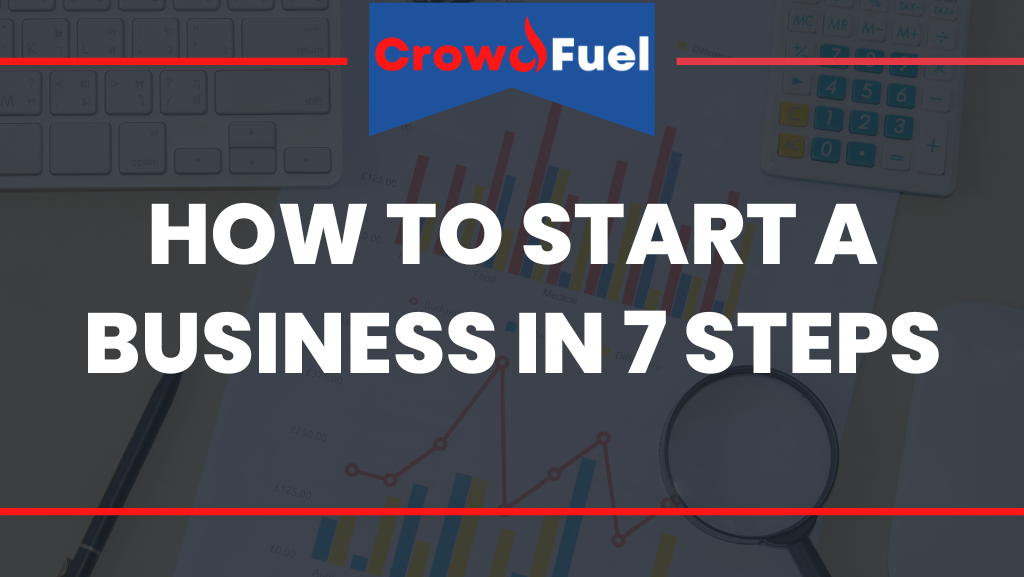How to Start a Business in 7 Steps
Starting a business can be an exciting yet daunting prospect. With careful planning and dedication, however, it is possible to make a successful go of it. Whether you’re a student, freelancer, or entrepreneur, here’s a guide to help you think about getting started. This guide is an overview that will link to more in-depth articles for which stage you’re at.
How to Start a Business in 7 Steps Checklist
1. Choose Your Business Idea
The first step in starting a business is deciding what kind of business you want to create. Do you have a hobby or skill that you could turn into a business? Are there products or services that you’d like to provide? Do your research and decide what kind of business will best fit your goals. Some questions to consider when refining your business idea.
- Am I selling a product or a service?
- Is my idea something that already exists? If it is, what is my specific niche?
- If this idea doesn’t exist yet, what companies sell something similar or operate in the same space?
- Am I monetizing a hobby?
2. Build Your Offering & Talk to Customers
Whether you’re selling a product or service, make sure you’ve figured out who you’re selling to and speak to some potential customers. This will allow you to better define your offering so you can more easily sell it. Depending what kind of business you’re building you will want to speak to a number of different potential customers to learn more about their needs. Some good benchmark numbers based on what type of business you’re building are:
- B2B: 10 people
- B2C: 100 people
- D2C: 100 people
3. Determine Funding Source
Figuring out how to fund a new business can be a daunting task. There are a variety of options to consider, including venture capital, angel investors, crowdfunding, government grants, and personal savings. It is important to research each option carefully to ensure that you are making a wise financial decision for your business. You should also consider consulting with a financial advisor or accountant to gain insight into the best option for your business. Additionally, you may need to look into taking out a loan from a bank or other financial institution. Taking the time to understand the various funding options and make an educated decision can be an important step in the success of your business. How your business takes shape can be dependent on your funding source. Some possible funding sources:
- Venture capital
- Angel investors
- Crowdfunding
- Government grants
- Pitch competition awards
- Bank loans
- Personal Savings
4. Register Your Business
Once you’ve created a business plan, you’ll need to register your business. This involves deciding on a business name and registering it with your state or local government. You’ll also need to obtain any necessary licenses or permits. Depending on what funding source you’ve decided on can influence what type of business you’ll incorporate. Some possible ways you could register your business:
- C-Corporation
- Limited Liability Company (LLC)
- Partnership
- Sole Proprietorship
5. Set Up Your Finances
The next step is to set up your finances. You’ll need to open a business bank account and decide how you’re going to handle your taxes. You may also want to consider setting up an accounting system to track your expenses and income. Depending on what kind of business you’re starting you may want to choose different banks since some specialize in certain businesses. Some example of specialized banks are:
- Silicon Valley Bank (SVB)
- Mercury Bank
- Brex
6. Market Your Business
Once you’ve registered your business and set up your finances, it’s time to start marketing your business. You’ll need to create a website, establish a presence on social media, and develop a marketing strategy to reach your target audience.
7. Track Your Progress
As your business grows, it’s important to track your progress. Keep track of your sales, expenses, and other metrics to see how your business is doing. This will help you make informed decisions and adjust your strategy as needed.
Starting a business is a big undertaking, but with the right plan and dedication, you can make it a success. Use this guide to get started and as you go along, you may find that you need to make adjustments to your plan. But with hard work, you can create a successful business.



